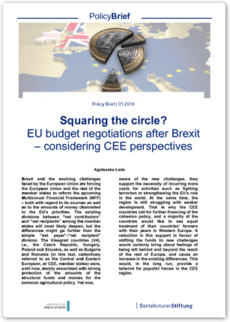EU budget negotiations after Brexit - considering CEE perspectives
- Format Type
- Date of publication
- 26/01/2018
- Volume/Format
- 14 pages, PDF
Format
-
PDF
Price
Free of charge
Description
Brexit and the evolving challenges faced by the European Union are forcing the European Union and the rest of the member states to reform the upcoming Multiannual Financial Framework (MFF) – both with regard to its sources as well as to the amounts of money channelled to the EU’s priorities. The existing divisions between “net contributors” and “net recipients” among the member states will most likely deepen, but the differences might go further than the simple “net payer”-“net recipient” division. The Visegrad countries, i.e. – the Czech Republic, Hungary, Poland and Slovakia, – as well as Bulgaria and Romania until now, were mainly associated with strong protection of the amounts of the structural funds and monies for the common agricultural policy. Yet now, aware of the new challenges, they support the necessity of incurring more costs for activities such as fighting terrorism or strengthening the EU’s role in the world. At the same time, the region is still struggling with weaker development. That is why the CEE countries call for further financing of the cohesion policy, and a majority of the countries would like to see equal treatment of their countries’ farmers with their peers in Western Europe. A reduction in this support in favour of shifting the funds to new challenges would certainly bring about feelings of being left behind and beyond the reach of the rest of Europe, and cause an increase in the existing differences. This would, in the long run, provide a tailwind for populist forces in the CEE region.



